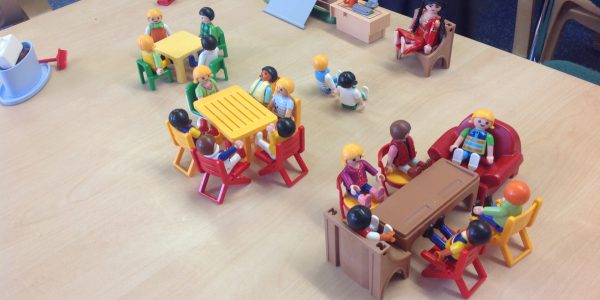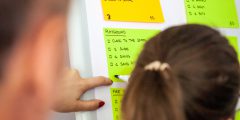Rupert Knight
View this author's profilePosts by Rupert Knight
Life on the ‘tricky table’
June 26, 2019
In this month’s primary blog post, Catherine Gripton explores ‘ability’ grouping from a child’s perspective and asks whether children experience ‘ability’ grouping in the way we think they do. To ‘ability’ group or not to ‘ability’ group? There is much debate about ‘ability’ grouping with questions raised about effectiveness and concerns that it widens …
Modelling: some thoughts on thinking aloud
May 23, 2019
In this post, Rupert Knight reflects on the value of modelling as a ‘core practice’ and the live, thinking aloud component of this in particular. In every teacher’s repertoire, there are a number of specific pedagogical practices that are fundamental to almost any subject taught. They might include, for example, explaining a new concept or …
What does continuous provision mean to you?
April 23, 2019
With the perpetually increasing pace of change in education it feels hard to keep up with new initiatives. Often when we do catch our breath we realise we haven’t fully grasped what the new jargon means or how we should be improving practice, sometimes we see repeated patterns and at other times we catch up …
When Less is More: Learning from professional development opportunities
March 21, 2019
Past posts in this series have discussed ‘Teaching for Mastery’ and the Shanghai-England primary exchange. In this new post Catherine Gripton reflects upon what she learned from observing a Chinese teacher’s lesson and considers these in the light of teacher professional development. Learning from lessons The Mathematics Teacher Exchange, involving teachers from England and …
The Importance of a Daily Whole-Class Read – Enjoying a Book for a Book’s Sake
February 18, 2019
Past posts in this series have discussed picture books in the primary classroom and high quality children’s literature. In this new post Sally Betteridge considers the benefits of reading to your class. The joy and wonder on their faces as you capture them in the imaginary world of the story – they are hooked on …
A Dialogic stance
January 16, 2019
Building on an earlier post in this series which looked at oracy, Rupert Knight considers here the concept of the dialogic classroom, how it relates to a culture valuing spoken language more generally and how this might serve a wider purpose. Oracy as a foundation A previous post in this series explored the concept of …
How can the building of ‘relationships’ maintain good classroom management?
December 13, 2018
The importance of mental health and well-being of children has become an important focus within education. In this post Esther Fulton considers the role of positive relationships in creating a nurturing classroom environment. The DfE has recently published a paper that highlights the importance of schools creating ‘safe and calm environments’ and ‘equipping pupils …
“Line up: boy, girl, boy, girl”: Revisiting gender labels in the primary school
November 12, 2018
BOY GIRL BOY GIRL BOY GIRL BOY GIRL GIRL GIRL BOY GIRL So, what is wrong with this pattern? The ninth term should be ‘BOY’, correct? This is a familiar type of simple repeating pattern than children in their Reception year might engage with. However, there is a deeper issue. Why do we …
Good habits? Habits of mind and mastery in the primary mathematics classroom
October 9, 2018
Primary mathematics teaching in the UK is undergoing something of a revolution as the roll-out of mathematics mastery continues. In this post, Rupert Knight considers how this relates to the idea of mathematical habits of mind and metacognitive strategies at a time when a new 2018 Education Endowment Foundation report has brought metacognition …
Homework – what is it and is this what we really want it to be?
September 10, 2018
Homework is an increasingly commonplace activity in the UK’s primary schools and thus in homes across the land. In this post, Rachel Lehner-Mear considers how homework is currently conducted and asks whether there might be a better approach. Why are we setting homework? As the new school year gets under way, the …


